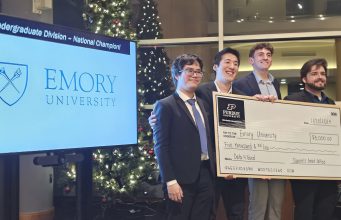When Marnie Harris 20MBA was an undergraduate biomedical engineering student at Georgia Tech, the notion that she would go to business school someday was “never, ever.”
With dreams of building a more accessible world, Harris helped found The Excel Program at Georgia Tech, a certificate program for students with intellectual disabilities. She and a student advisory board researched comparative programs, drafted a curriculum, and solicited buy-in from the University. In addition, the program focuses on finding internships that prepare students for their careers. When Harris graduated, she stayed on to welcome the first cohort of Excel students to Georgia Tech.
Discovering the Power of Business
But Harris soon came to believe that creating meaningful employment for this demographic must begin inside business, where the jobs are. Harris wanted to make that happen, so at the encouragement of one of her mentors, she started applying to business schools.
I realized business was really the way that change would happen. It will be the business community harnessing the value these individuals bring.
Marnie Harris 20MBA
In choosing Goizueta Business School, where she earned an MBA in 2020, Harris found a flexible program that allowed her to pursue her natural impulse to innovate.
She spent a semester honing financial modeling skills working with coffee growers in Guatemala and another creating a marketing strategy for a wheelchair manufacturing entrepreneur in Uganda.
Harris received the Woodruff Scholarship, Emory’s most prestigious named scholarship, awarded to Emory applicants who want to make a positive social impact and leave a lasting imprint on the University through their leadership, academic performance, and lifelong relationships.
Launching the Shepherd Hotel
Though Harris is no longer an engineer, in many ways she still thinks like one, seeing opportunities to solve complex challenges. After graduation, a Goizueta classmate and fellow Woodruff scholar introduced her to Rich Davies, president of Pavilion Development Company, who together with Rick Hayduk, a long-time hospitality executive, was building a hotel in Clemson that prioritized employing staff with intellectual disabilities in collaboration with ClemsonLIFE, similar to the Excel program Harris had started at Georgia Tech.
As part of the development team for the flagship Shepherd Hotel, Harris built the core of the brand and its marketing strategy, and structured a collaboration with Clemson University and ClemsonLIFE. Harris is now developing the Shepherd Hotels brand through franchising. She works with experienced developers and operators looking to bring a Shepherd Hotel to their university home. Harris supports these franchisees to build collaborations with universities and their Inclusive Postsecondary Certificate Programs, driving best practices toward processes, strategies and technology to employ a collective number of adults with intellectual disabilities in hospitality.
“One of the things that we decided very early on was that … local buy-in and ownership was really important,” Harris says.
I love getting to work with our partners and to see the concept become theirs. I know we’re successful when our partners talk about our Shepherd Hotel rather than your Shepherd Hotel.
Marnie Harris 20MBA
Eighty percent of people with intellectual disabilities are underemployed, Harris says.
“If you looked at that statistic across most other populations, it would be staggering. I think as we become staggered by that number, we see a massive population of people that have incredible potential that we’re leaving on the sideline.”
A Humanitarian Vision
The franchise effort has the energy of a startup in the humanitarian space—a priority for Harris.
It’s so fun. I like that it’s creative, and I like that it’s purposeful. We’re creating boutique hotel experiences where we target building teams that include 30 percent individuals with intellectual disabilities. I love the purpose-driven aspect of it.
Marnie Harris 20MBA
All the jobs are mission critical, and many involve customer interaction.
“People want purpose-driven experiences where they feel genuinely appreciated and valued when they stay somewhere,” she says. “I also think employees are just looking for better workplaces. We have tried to create a workplace with a grace-filled atmosphere where people with disabilities can be successful. Everyone benefits, including our non-disabled employees who work in an environment where they feel valued and purposeful in their work.”
Building Inclusive Workplaces
Harris says her background taught her how to “take these massive problems and turn them into solvable parts.” She envisions building a workplace at Shepherd that acknowledges the very full and busy lives employees have, so people can build their careers, their families, and their interests at the same time.
“We’re all people outside of work too, and there is a work-life integration that has to happen in order to make a more diverse and equitable work environment,” Harris says. “I am really hopeful that we can maintain the principles of integrity that we’ve been able to launch the Shepherd brand with, and carry that into growth, knowing some of the challenges that takes.”
Your support of scholarships helps us attract and retain top students and improve the diversity and talent of our student body. Our goal is to create equal access and opportunity for all students with the talent and abilities to drive business forward, regardless of their ability to pay. Support scholarships today!










